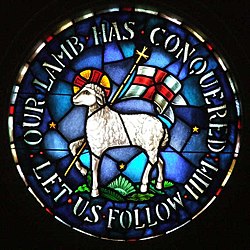Moravian Brethren
| Unitas Fratrum | |
|---|---|

The seal of the Moravian Church featuring the Agnus Dei.
Stained glass at the Rights Chapel of Trinity Moravian Church, Winston-Salem, North Carolina, United States |
|
| Classification | Protestant |
| Orientation | Hussite beliefs with Lutheran Pietist influences |
| Founder | followers of Jan Hus and Petr Chelčický |
| Origin | 1457 Bohemia |
| Congregations | 1000+ |
| Number of followers | 750,000 |
The Moravian Church (Latin: Unitas Fratrum, meaning Unity of the Brethren;Czech: Jednota bratrská or Moravští bratři), in German known as Herrnhuter Brüdergemeine (meaning Brethren's Congregation from Herrnhut, the place of the church's renewal in the 18th century), is one of the oldest Protestant denominations in the world, with its heritage dating back to the Bohemian Reformation in the fifteenth century.
The name by which the Church is commonly known comes from the original exiles who fled to Saxony in 1722 from Moravia to escape religious persecution, but its heritage began in 1457 in Bohemia and its crown lands (Moravia and Silesia), then an autonomous kingdom within the Holy Roman Empire (today the Czech Republic). The modern Unitas Fratrum, with about 750,000 members worldwide, continues to draw on traditions established during the eighteenth century. The Moravians continue their long tradition of missionary work, for example in the Caribbean. This is reflected in their broad global distribution. The Church places a high value on ecumenism, personal piety, missions and music.
The Church’s emblem is the Lamb of God (Agnus Dei) with the flag of victory, surrounded by the Latin inscription: Vicit agnus noster, eum sequamur (English: "Our Lamb has conquered, let us follow Him").
The Hussite movement that was to become the Moravian Church was started by Jan Hus (English: John Huss) in early 15th century Bohemia, in what is today the Czech Republic. Hus objected to some of the practices and doctrines of the Catholic Church; specifically, he wanted the liturgy to be celebrated in Czech, lay people to receive communion in both kinds (bread and wine – that is, in Latin, communio sub utraque specie), married priests, and eliminating indulgences and the idea of Purgatory. Since these actions predate the Protestant Reformation by a century, some historians claim the Moravian Church was the first Protestant church.
...
Wikipedia
